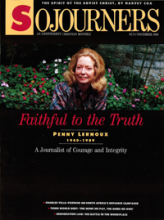The apostles said to the Lord, 'Increase our faith!' And the Lord said, 'If you had faith as a grain of mustard seed, you could say to this sycamore tree, "Be rooted up, and be planted in the sea," and it would obey you'" (Luke 17:5-6).
It's always the most fundamental scriptures -- the familiar ones about faith and justice and concern for the poor -- that are the hardest to preach on at home. When the themes are ones we struggle day in and day out to commit our lives to, I sometimes wonder after all these years if there is anything new to say.
When this scripture made a recent appearance in our lectionary, and I was the scheduled preacher, I felt at a loss. I remembered the last time this passage was preached at Sojourners. Rob Soley, who was a teacher of young children in a Montessori school at the time, brought in a small handful of mustard seeds. He explained that when he passes them around to children, he tells them to be careful how they breathe as they look at them. The least bit of wind would blow these tiny seeds away.
I recognized then why this metaphor was so powerful to Jesus' disciples, who lived in a society based on the land -- on planting and harvesting and the promise that small seeds hold. The message of the mustard seed was a clear sign that even the smallest faith can move trees -- or mountains. But apparently the faith of the disciples -- and us -- doesn't even add up to a molecule of a mustard seed; I haven't seen a lot of trees throwing themselves into the sea lately.
Read the Full Article

